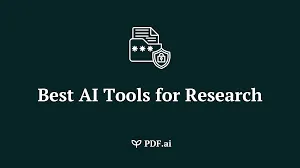The landscape of academic research is rapidly evolving, thanks to advancements in artificial intelligence (AI). In 2025, AI tools are no longer just optional—they are essential for streamlining workflows, enhancing productivity, and improving the quality of research. Whether you’re a student, academic, or professional researcher, these AI tools can transform the way you work. Among these, ResearchPal stands out as a game-changer, offering early access to cutting-edge technologies like OpenAI’s O1 and integrating them seamlessly into its platform.
Top AI Tools for Research in 2025
1. ResearchPal
ResearchPal is a comprehensive AI-powered research tool designed to automate and simplify the entire research workflow. Here’s what makes it a must-have for researchers in 2025:
- Early Access to OpenAI O1: ResearchPal provides early access to OpenAI’s latest models, including O1, enabling users to generate high-quality content, analyze data, and gain insights faster than ever. From literature reviews to manuscript drafting, ResearchPal integrates AI at every step, saving time and effort.Summarize lengthy research papers in seconds, extracting key points and insights. Automatically organize references and generate citations in various formats. Designed for researchers of all levels, ResearchPal’s intuitive interface makes complex tasks simple.
To explore these features, visit the features page or check out the pricing page to get started for free.
2. Zotero AI
Zotero, a popular reference management tool, now includes AI features such as:
- Smart citation suggestions based on your research topic.
- Automated categorization of sources.
- Integration with AI writing tools for seamless manuscript preparation.
3. EndNote AI
EndNote has incorporated AI to improve its functionality, offering:
- AI-driven literature recommendations.
- Automated formatting of citations and bibliographies.
- Collaboration features for team-based research projects.
4. Grammarly GO
Grammarly’s AI-powered writing assistant, Grammarly GO, helps researchers:
- Improve the clarity and tone of their writing.
- Detect and correct grammar, spelling, and punctuation errors.
- Generate suggestions for rephrasing and enhancing sentences.
5. Iris.ai
Iris.ai is an AI research assistant that specializes in:
- Extracting key information from research papers.
- Mapping research trends and identifying gaps.
- Automating systematic literature reviews.
6. Scite AI
Scite.ai uses AI to analyze citations and provide context, helping researchers:
- Evaluate the reliability of sources.
- Identify influential papers in their field.
- Track how their work is being cited.
7. Overleaf AI
Overleaf, a collaborative writing tool for LaTeX, now includes AI features such as:
- Automated formatting and error detection.
- Real-time collaboration with AI-powered suggestions.
- Integration with reference management tools.
8. Consensus
Consensus is an AI tool designed to help researchers:
- Find evidence-based answers to research questions.
- Summarize findings from multiple studies.
- Identify consensus and disagreements in the literature.
9. Genei
Genei is an AI-powered research tool that offers:
- Automated summarization of articles and documents.
- Keyword extraction and topic modeling.
- Integration with cloud storage for easy access to research materials.
Why ResearchPal Stands Out in 2025
While all these tools offer valuable features, ResearchPal stands out for its comprehensive approach to research automation. By integrating early access to OpenAI’s O1 model, ResearchPal provides users with unparalleled capabilities, including:
- Advanced Content Generation: Create high-quality drafts, summaries, and insights with ease.
- Seamless Workflow Integration: Automate every step of the research process, from data collection to manuscript submission.
- Cutting-Edge AI Technology: Stay ahead of the curve with access to the latest AI innovations.
How to Choose the Right AI Tool for Your Research
When selecting an AI tool, consider the following factors:
- Your Research Needs: Choose a tool that aligns with your specific requirements, whether it’s writing assistance, data analysis, or citation management.
- Ease of Use: Look for tools with intuitive interfaces and robust support resources.
- Integration Capabilities: Ensure the tool integrates with other software you use, such as reference managers or writing platforms.
- Cost: Evaluate the pricing and choose a tool that fits your budget.
Final Thoughts
AI tools are revolutionizing the way research is conducted, making it faster, more efficient, and more accessible. Among these, ResearchPal stands out as a leader, offering early access to OpenAI’s O1 model and integrating cutting-edge AI into every aspect of the research workflow.
Whether you’re a student, academic, or professional researcher, these tools can help you achieve your goals with greater ease and efficiency.







